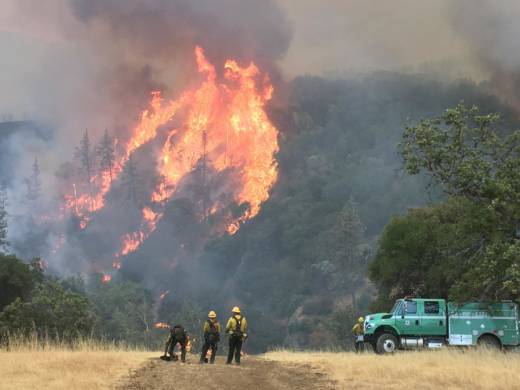"Why would you engage in this kind of risk, put your life at risk in this way, if you and your family have no way of holding anyone accountable if you're injured," said Veena Dubal, an associate professor at UC Hastings College of the Law.
"It seems unduly harsh," said Dubal, who studies the gig-worker economy. "It also might speak to the fears around an increased number of contractors used in fighting fires and fears of liability against the state."
Workers for companies that contract with Cal Fire do not have the same protection as state employees. For instance, the thousands of firefighters on the Cal Fire payroll are members of Cal Fire Local 2881 and get death benefits negotiated by the union.
Few Options for Families
Without those benefits, relatives of contractors killed in a wildfire are left with few options, according to Craig Peters, an attorney with the San Francisco-based Veen law firm who specializes in heavy equipment and construction site injuries.
"They (Cal Fire) win on both ends when they hire a contractor," Peters said. "They don't have to give them all the benefits of an employee and don't have to provide any benefits to them when they pass away because they can shield themselves.
"Just out of a pure issue of equity and fairness, they ought to be providing some benefits to those families, which would be those families being able to sue to get fair compensation."
The companies hired to help Cal Fire and the U.S. Forest Service battle wildfires, by providing them heavy equipment like bulldozers and water trucks as well as the workers to operate them, are required to have current workers' compensation coverage for their employees.
But three times in the past year or so, KQED's reporting has found, small firms employing contractors killed or seriously injured fighting California wildfires have turned out not to be carrying the required workers' comp coverage.
The company that hired Reagan, killed when his bulldozer rolled over, did not have workers' comp. The firm that employed John Tiersma, a water tender driver seriously injured while working on the same blaze, did not have the benefit. And the company that hired Garrett Paiz, killed last month helping battle the Nuns Fire in Napa County, also lacked workers' comp.
Dubal points out that many of the firms the state relies are on are small, run by owners who are probably just getting by.
"They're struggling themselves and so they don't pay for workers' compensation, and the fact that the state requests that they do that is crazy," Dubal said. She says the state should foot the bill for the coverage.
State workplace regulators say families of those whose firms fail to get workers' comp policies can sue the employers and file claims for death benefits with the Workers' Compensation Appeals Board.
But some firefighter advocates agree with Dubal that government agencies should cover the cost of workers' compensation insurance for private contractors.
Over-reliance on Contractors?
Rich Fairbanks, a former U.S. Forest Service firefighter who's now on the board of the Oregon-based Firefighters United for Safety, Ethics and Ecology, says the reliance on private contractors has gone too far.
"It's gotten to a ridiculous point where you're getting people killed and you can't even compensate the widow," Fairbanks said.
Every three years Cal Fire reviews whether the workers' compensation policies of private heavy equipment operators are current, according to agency spokeswoman Janet Upton.
The recent cases of contractors lacking the workers' comp coverage have prompted the agency to look for new ways to ensure contractors abide by the rules, Upton said.
"Cal Fire program staff will be exploring ways to bolster the state contract provisions with additional provisions specific to the department's use of hired equipment on the state's wildfires," Upton said in an email. The agency plans to hold a meeting on the issue this December.

